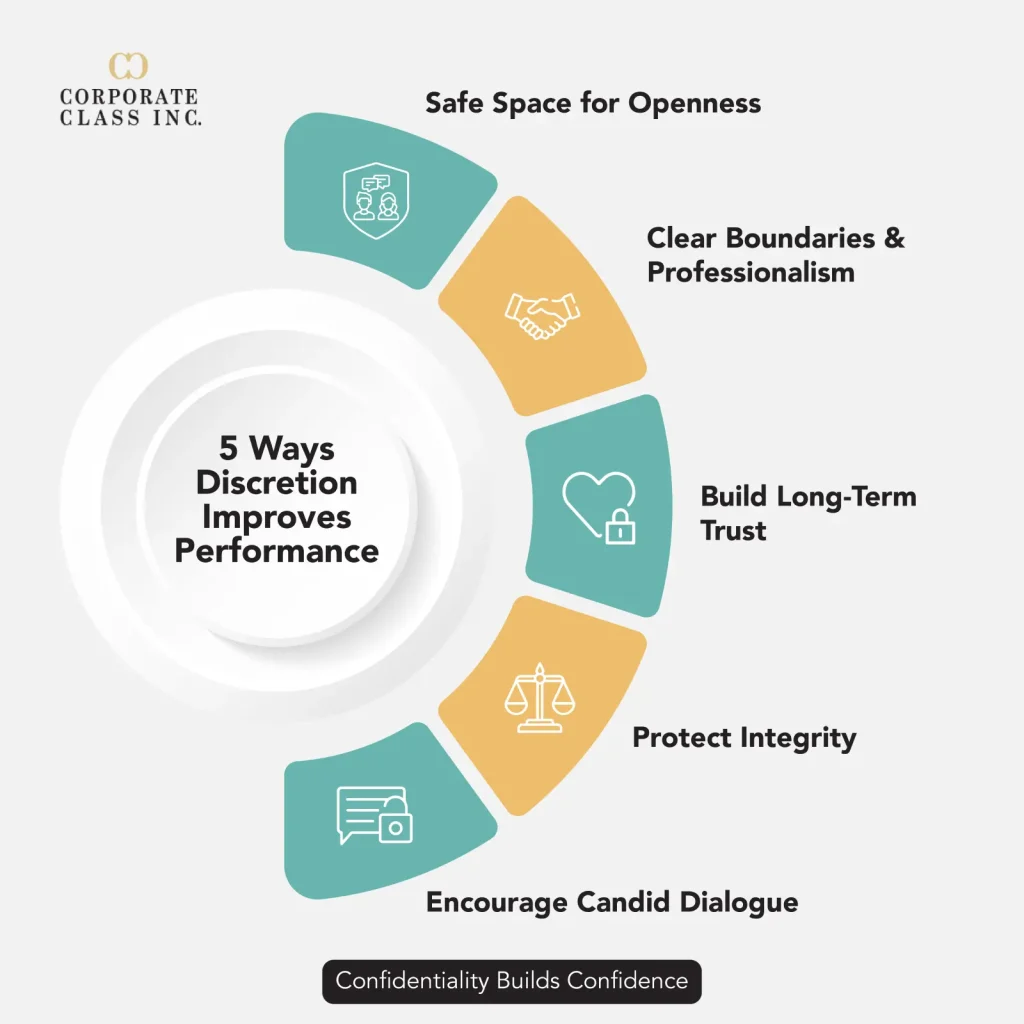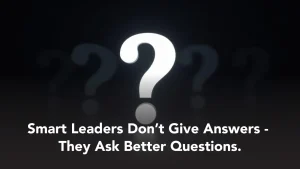Confidentiality builds trust in executive coaching by ensuring leaders feel secure when sharing sensitive information. When executives know their concerns, mistakes, and ambitions stay private, they engage more openly in the process. This safe exchange strengthens the coaching partnership, accelerates growth, and supports better decision-making. In this article, you’ll see why confidentiality is the cornerstone of coaching, how it shapes high-trust relationships, and the risks of neglecting it.
Key Takeaways
- Confidentiality builds trust by creating a safe space where leaders speak openly without fear of judgment.
- Clear boundaries, discretion, and respect for privacy help executive coaches strengthen long-term partnerships.
- Breaches in confidentiality can damage both individual careers and organizational culture.
Why Confidentiality Is the Silent Foundation of Coaching
Executive coaching only works when leaders know they can speak freely. Imagine discussing your biggest leadership challenge with the risk of exposure. You’d filter every word, soften the truth, and skip over the real issue. That’s why confidentiality is non-negotiable.
A coaching relationship functions like a private vault. Leaders bring in their toughest problems, from underperforming teams to personal doubts, and they need assurance that nothing will leave the room. Coaches then use those candid insights to guide, challenge, and refine leadership skills. Without full transparency, the process becomes surface-level, delivering little long-term impact.
Research from the International Coach Federation revealed that 96% of executives consider confidentiality the most critical factor in coaching effectiveness. The data confirms what practice shows: without privacy, trust collapses, and coaching loses its value.
What High-Trust Coaching Really Looks Like at the Executive Level
High-trust coaching doesn’t mean leaders just “open up a bit.” It means they bring their unfiltered thoughts to the table. They share frustrations about board dynamics, admit to blind spots, and test risky ideas. This environment is where growth accelerates.
At the executive level, confidentiality supports three interconnected outcomes:
- Personal Growth: Leaders acknowledge weaknesses they’d never admit publicly, which unlocks real development.
- Organizational Impact: Executives dissect internal issues that could harm reputation if leaked.
- Strategic Clarity: Risky scenarios can be explored privately before public execution, leading to sharper decisions.
When confidentiality and trust intersect, coaching shifts from a tactical discussion into a strategic advantage. Leaders start to see the coaching room as a laboratory for leadership, testing, experimenting, and analyzing without external judgment. That’s what separates average sessions from truly transformative ones.
5 Scenarios Where Discretion Drives Better Performance

Confidentiality isn’t theoretical; it’s tested in real, high-stakes scenarios. These are the moments where discretion turns into measurable performance gains.
Creating a Safe Space for Openness
Leaders carry the pressure of appearing strong to their teams, investors, and boards. In coaching, they finally get to drop that mask. When executives know they can voice insecurities without consequence, they process stress more effectively and make clearer decisions.
Establishing Clear Boundaries and Professionalism
Boundaries define trust. Coaches who outline exactly what remains private and how information is handled build credibility. For executives, those boundaries create psychological safety, reinforcing the professionalism of the relationship.
Building Long-Term Trust and Commitment
Trust isn’t built in one session, it compounds. Each confidential discussion that stays protected becomes proof of reliability. Over time, this creates a bond strong enough to carry through organizational crises and leadership transitions.
Protecting Both Individual and Organizational Integrity
Executives often carry sensitive company data, from merger talks to restructuring strategies. Confidentiality shields both the leader’s reputation and the organization’s integrity. By safeguarding both, coaches demonstrate accountability to every stakeholder involved.
Encouraging Candid Dialogue
When privacy is guaranteed, executives stop holding back. They discuss political tensions, personal fears, and untested ideas. That honesty allows coaches to provide sharper feedback, driving breakthroughs that would never surface in guarded conversations.
Risk Exposure: What Breaks Confidentiality and How It Backfires
Even the strongest coaching relationship can collapse if confidentiality breaks. The damage is immediate: leaders stop sharing openly, second-guess the process, and withdraw from deep engagement. What follows is a coaching partnership that becomes transactional rather than transformational.
Breaches ripple outward, too. Executives may hesitate to seek coaching again, slowing their development. Companies lose the benefits of leadership improvement and may even face attrition if leaders feel unsupported. Worse, breaches can create distrust across teams, fueling skepticism about professional development programs as a whole.
Common risk exposures include:
- Sharing coaching discussions with HR or peers without explicit consent
- Using session insights in company meetings without anonymization
- Storing confidential notes in unsecured files or open communication channels
The fallout is predictable: once trust is broken, it’s nearly impossible to rebuild. Confidentiality isn’t just a formality, it’s the lifeline of coaching effectiveness.
How to Build a Culture of Trust Inside the Coaching Container
Creating a coaching culture built on trust requires more than verbal promises. It needs structure, consistency, and behavioral proof.
The foundation starts with clear agreements. At the beginning of the engagement, both the coach and the executive should align on the scope of confidentiality. This alignment ensures clarity, reducing assumptions about what can and cannot be shared.
From there, trust must be reinforced through consistent actions. Coaches who model discretion in every interaction, never disclosing details, respecting time boundaries, and securing documentation, prove their commitment. Leaders notice consistency, and over time, it creates confidence.
Finally, leaders themselves play a role in sustaining the culture. By honoring the boundaries of coaching sessions and engaging openly, they signal to the coach that confidentiality is both valued and reciprocated. The result is a true partnership where trust becomes the default setting.
FAQ
How Does Confidentiality Build Trust in Executive Coaching?
Confidentiality ensures that private discussions stay private, giving executives the confidence to speak openly. This openness builds trust, which is the foundation of effective coaching.
What Happens If Confidentiality Is Broken in Coaching?
Breaching confidentiality damages the coaching relationship and reduces the leader’s willingness to engage. It can also harm organizational culture by weakening respect for privacy.
Can Confidentiality Extend to Organizational Issues as Well as Personal Concerns?
Yes. Coaches protect both personal disclosures and business-sensitive information. This dual protection strengthens trust and supports more comprehensive coaching outcomes.
Strengthening Trust and Confidentiality in Coaching
Strengthening trust and confidentiality requires consistency, discretion, and respect. Executive coaching only works when leaders feel fully secure in their conversations. By protecting information and honoring boundaries, coaches create a space where executives can perform at their best. If you want to experience coaching that values confidentiality as the true foundation of trust, the next step is clear, engage with professionals who live by these standards.





